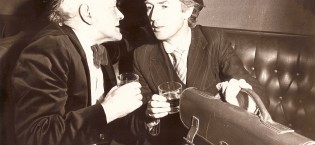The Money Doesn’t Matter
 How often have we heard the saying – “Money isn’t everything”. Perhaps some of us believe this old proverb while others laugh it off as an excuse repeatedly offered by those who never had any money to squander lavishly. However, the whole question had an airing in the Town Hall, Sligo on Sunday, Monday, Tuesday and Wednesday nights last when Sligo Drama Circle presented “The Money Doesn’t Matter”. This three act play touched on all aspects of the money question and the author Louis D’Alton used his characters as you might use ten ordinary persons chosen at random from a crowd as each player seemed to have his or her own views on the subject.
How often have we heard the saying – “Money isn’t everything”. Perhaps some of us believe this old proverb while others laugh it off as an excuse repeatedly offered by those who never had any money to squander lavishly. However, the whole question had an airing in the Town Hall, Sligo on Sunday, Monday, Tuesday and Wednesday nights last when Sligo Drama Circle presented “The Money Doesn’t Matter”. This three act play touched on all aspects of the money question and the author Louis D’Alton used his characters as you might use ten ordinary persons chosen at random from a crowd as each player seemed to have his or her own views on the subject.
Although the word money was to be the password or the adopted code throughout, the play had many other attractive aspects. At times, it was ludicrously funny, but it was always interwoven with sorrow, a sorrow which, in one sense, held our attraction from the start. Had not another subject, other than money, been involved, the play would have lacked the over-powering appeal which was so evident. It was luminously clear from the start that encompassed in this circle of drama were actors and actresses all of whom gave sincere performances. The finished product bore this out. The lighting and settings all added to make the presentation one to be remembered.
The story was set in the breakfast room at Knockderry House, home of widower Tom Mannion. He had fought his way up the ladder the hard way, and was now one of the wealthiest men in his home town – a man who lived for money, a man who saw everything through a “web of gold”. His idea was to give his family the things in life which he did not get himself, and although this idea worked out to some small degree, it could never really succeed. One of his daughters, Norah, wanted to join a religious order, but from the start her father was against the idea. It was not until the closing minutes that he gave his consent. The second daughter, Veronica, had a character which had very little resemblance to that of her sister’s. She married a worthless young fellow who, although he was a skilled young tradesman, could never hold a job. Consequently, Veronica was always in need of money which her father was very reluctant to part with.
Of the two sons, Harvey seemed to have won the confidence and trust of his father. He became a successful businessman but was killed in a motoring accident at an early stage of the play. Enter the black sheep of the family – Philip Mannion who immediately returned from London to “comfort” his father in his hour of need. Of all the family, he alone was the Number 1 spendthrift. His father had hopes that his son might become a composer and had wasted a considerable amount of money on him to achieve this end. However, Philip had other ideas. His emotions were governed by drink to the extent that his father could not even trust his son with the train fare back to London for fear the “musician” would retire to the public house on the corner and drink all the money as he had done on so many occasions before.
However, it was one of the persons who had very little to do with the plot who did that little bit extra to capture our attention. As the man who was gardener cum message boy, Paddy Dooney as Mick Kenirons, or simply Kenirons as he was known to everyone in the household, excelled. His characterisation of a man who was always willing to give a lucid description of any one event but who was never behind the door when the occasion arose for making an extra few shillings left nothing to be desired. All he wanted in life was “enough and a little biteen left over”. Playing the part of Philip Mannion the “musician”, Michael O’ Rourke added considerably to the mirthful end of the play. He had his own ideas on how to spend money – his father’s money. He also had his own ideas about the various stages of drunkenness. The idea that the money didn’t matter was heresy as far as he was concerned. A person always needed something for support, was his motto and he could never have been more correct than in the closing scene when he returned home for a second time. He certainly needed support then.
As the stern father, Joe Mc Morrow did everything that could be expected of a character of this description. The idea of his daughter becoming a nun came as an unsavoury shock to him and the force and anger he instilled into each phrase bore this home unquestionably to he audience. His refusal to give his permission was incessant as through and through he was a businessman who always felt happy for days after making a good deal. In many ways he was selfish but he won the respect and admiration of everyone. Josephine Lappin, as Norah Mannion the girl who would not countenance her father’s wish that she should stay in the house to comfort, played her part with a feeling of self-assurance and over-brimming sincerity. To her, money meant nothing as she knew in her heart that she must disobey the austere command of her father in order to follow her vocation. Here was a difficult part, simplified by the warm honesty of a true actress.
The part of Ellen Kinchella, the house maid, was taken by Tecie Mullen, who was unremitting in her efforts to please her employer, Tom Mannion. She learned a lesson or two in human perfidy and folly when she lent money to various members of the Mannion household. The part was played exceedingly well and she acquitted herself with tact as there was nothing to overshadow the versatility of her acting. One had to pity Father Maher, played by Joe Mc Donagh, as he had to reason with Tom Mannion when he was looking for money for a new school and again when he was interceding between Norah and her inimical father. His policy, when dealing with men like Mannion, was to appeal to their lower instincts as it would be futile appealing to their better instincts. His quiet and over-powering nature, excellently played by Mr. Mc Donagh, endeared him to the hearts of all.
Marie Mulvihill, as the devil-may-care Veronica, sought the sanctuary of Knockderry House for one reason – to partake of her father’s riches. Se feigned sickness in order to stay at home but her father was never deceived. However, he did give in in the end, when he discovered his daughter had, in her own small way, some latent talents. Marie Mulvihill was the ideal selection for this part and she filled it with imagination. Her characterisation of the frenzied young lady who became suddenly ill will especially be remembered as a highlight. In smaller parts were cast Timothy Mc Keogh as Harvey Mannion, the ambitious son who was killed in the motor accident; Michael ó Dálaigh as Michael Harney who was engaged by Tom Mannion to marry his daughter and George O’ Donnell, as Robert Murtagh, the retiring businessman who intended to settle down and live ten or fifteen remaining years of his life in luxury. All three were well suited to their parts and played them as they should be played. The horse trainer, Michael Harney, who thought he should not get married for at least another ten years, quickly changed his mind when he heard that Tom Mannion was giving a dowry of seven thousand pounds with his daughter. Well, he did try hard to win Norah’s hand but – the money didn’t matter.
The play was directed by Mr J. P. Mc Garry who is to be complimented on its success. The stage staff consisted of Messrs. Ted Morrissey, Michael Clancy, Andrew Higgins and Tony Foley. Make-up man was Mr. Jim Hughes and Miss Breege Butler played the music.
from The Sligo Champion, March 1st, 1958
Tags: History, Louis D'Alton, Press Reports, Reviews







